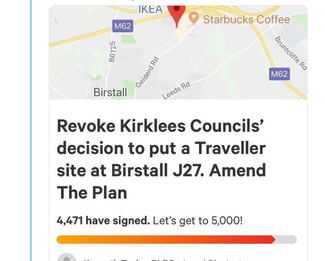Zero tolerance against promoting anti-Gypsy rhetoric

Discrimination and prejudice experienced by the Gypsy, Roma and Traveller communities of Britain is often presented as ‘the last acceptable form of racism’. We are no longer accepting this, and neither should you - argue Brigitta Balogh and Colin Clark
Change.org has recently published a petition addressed to Prime Minister Theresa May, with the intention to revoke Kirklees Council’s decision to develop a Traveller site at Birstall in West Yorkshire. The petition, which has reached nearly 5,000 supporters, has now been edited and all negative references to Gypsies and Travellers as well as links to crime have been removed. Comments are no longer allowed.
What is the background to this petition? Kirklees Council, led by Labour, decided to establish a permanent site close to Birstill. This was in response to a recognised need for provision for Gypsy and Traveller families in the area. The reaction, from some local people, was to take matters into their own hands and start a campaign against the site development. The text that originally accompanied the petition raised concerns about potential rises in ‘criminal’ activities, making it clear that it is not about protecting the ‘green belt’ area but making sure that Gypsies and Travellers were kept out of town.

Further, comments made it clear that local people did not want Gypsies and Travellers as their neighbours, calling them thieves and other unpleasant words, indicating that the local shopping mall and other businesses would be targeted by people living on the new Gypsy site. Interestingly, the redrafted petition now frames the issue as one of ‘tax paying parents’ facing extra traffic and congestion and falling house prices, as well as it being ‘unkind’ to site residents, that is Traveller families, in an already busy location (this is a familiar fig leaf to hide anti-Gypsy racism).
It is worth noting that Change.org is a for-profit corporation based in San Francisco and it has been set up to be a supposedly ‘empowering platform’ for people, in an ‘open and safe’ way, to take action on issues they believe in. The global reach of this business is huge, with claims from change.org itself of over 240 million registered users. The organisation has also been heavily criticised, regarding issues such as ‘fake’ signatures, the selling of personal data and its advertising policies to name just a few.
With regards to the petition in question, we must ask certain questions in the context of UK and European equalities and human rights legislation: is the petition racially motivated? Does it promote hatred and negative stereotypes towards a specific group in society? The answers appear to be yes, it does. Naturally, the question then arises how could such a petition have been approved by change.org in the first place? The answer seems to come down to economics and data mining. Indeed, if you search change.org you will find similar ‘live’ petitions against Gypsies and Travellers within seconds, such as the one entitled ‘Get Gypsies Off Our Street’.
It is also apparent, when looking closely at the terms and conditions of change.org, that the corporation does not appear to take on much responsibility for the petitions that it actually helps create. Within the terms and conditions, and under ‘user content’ information, the website states that users are responsible for what they post. This is, of course, a disclaimer and means little in legal terms. However, if what is posted violates the laws of the country that the petition is concerned with, the rights of others, or change.org, they might intervene and remove the offending petition. When you examine the Community Guidelines section of the change.org website it specifically indicates that there should be no promotion of hate speech via the site:
‘We’re fans of free speech, but we don’t allow hate speech. Hate speech is typically the advocacy of beliefs or practices that attack or malign an entire class of people based on characteristics such as their age, color, disability, ethnic origin, gender identity, nationality, national origin, race, religion, sex, sexual orientation, medical condition, or veteran status.’
In a sense, it is obvious that this is what has happened here with regards to the Kirklees petition. Gypsy and Traveller communities, once more, have been labelled and stereotyped based on ethnic origins. Disappointingly, change.org did not pick up on this fact as they do not properly monitor user content. Activists who have been campaigning for the communities for some time now can observe that such hate crime and cyber-bullying against the communities is very common and increasing. The hostility against the communities is, in fact, now being openly encouraged by the Government and the situation rapidly deteriorates by the hour. We can witness that current equalities legislation has failed to offer protection and fails to promote the rights and entitlements of Gypsy and Traveller communities.
In closing, we would suggest that websites, including change.org should have more active and regularly checked filters. Hate speech should be taken much more seriously on the internet and there should be zero tolerance against anyone who promotes anti-Gypsy rhetoric. Hateful comments on the internet attacking members of the communities based on their ethnic origin is still common. Shutting down the comments section is a small victory but not a satisfying one. Given the exploitation, the human rights violations, no website should allow such petitions to appear on their platform in the first place, given that there is a fine line between freedom of speech and hate speech.
Finally, it is important that the Government and policy-makers move to make Anti-Gypsyism a criminal offence. This form of ‘last acceptable racism’ needs to end now. Gypsy, Roma and Traveller people’s rights require protection and promotion. Those who are willing to go the extra mile to violate these rights, should bear the legal consequences as we have a task to teach society to condemn anti-Gypsyism. We all have this duty, whether a member of the targeted communities or not. Solidarity is important in the current digital age.
By Colin Clark and Brigitta Balogh